

Article 29 Working Party « Privacy and information law blog. Over the years, the number of on-site inspections by the French DPA (CNIL) has been on a constant rise.
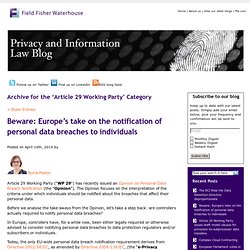
Based on the CNIL’s latest statistics (see CNIL’s 2013 Annual Activity Report), 458 on-site inspections were carried out in 2012, which represents a 19 percent increase compared with 2011. The number of complaints has also risen to 6,000 in 2012, most of which were in relation to telecom/Internet services, at 31 percent. In 2012, the CNIL served 43 formal notices asking data controllers to comply. In total, the CNIL pronounced 13 sanctions, eight of which were made public. In the majority of cases, the sanction pronounced was a simple warning (56 percent), while fines were pronounced in only 25 percent of the cases. Data protection law & policy. Art. 29 Party Opinion Parses Data Protection Rules Application to Geolocation Information.
Article 29 Working Party - Consent for Geolocation Services, Business Law Firm, Fox Williams. June 8, 2011.

Article 29 Working Party leaves geo-location service providers disorientated after strict data protection opinion about geo-location data. The Article 29 Working Party has concluded an opinion on geo-location services on smart mobile devices (such as smart phones and tablet computers) by saying that they are linked to natural persons and therefore any geo-location data involving the devices are deemed personal data.
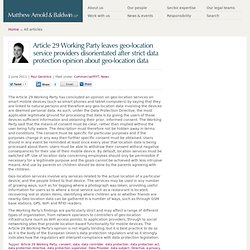
As such, under the Data Protection Directive, the most applicable legitimate ground for processing that data is by giving the users of those devices sufficient information and obtaining their prior, informed consent. The Working Party said that the means of consent must be clear, rather than implied without the user being fully aware. The description must therefore not be hidden away in terms and conditions. Article 29 Working Party Opines on Geolocation Services. On May 16, 2011, the Article 29 Working Party (the “Working Party”) adopted an Opinion on geolocation services on smart mobile devices (the “Opinion”).
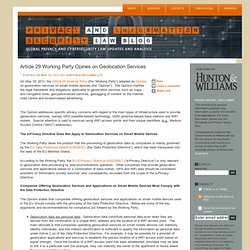
The Opinion clarifies the legal framework and obligations applicable to geolocation services such as maps and navigation tools, geo-personalized services, geotagging of content on the Internet, child control and location-based advertising. The Opinion addresses specific privacy concerns with regard to the main types of infrastructure used to provide geolocation services, namely GPS (satellite-based) technology, GSM (antenna-based) base stations and WiFi routers. Special attention is paid to services using WiFi access points and their unique identifiers (e.g., Medium Access Control (“MAC”) addresses).
Article 29 Working Party Opines on Geolocation Services.
Google fined EUR100,000 over collection of smartphone Wi-Fi data. The French National Commission for Information Technologies and Civil Liberties (CNiL) told Google last May that it had to stop collecting details of users' Wi-Fi networks and content that passed over them.
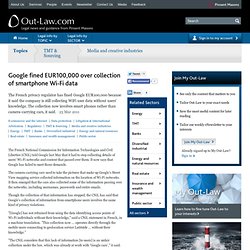
It now says that Google has failed to meet those demands. Let’s not panic about smartphones « Privacy and information law blog. Posted on May 18th, 2011 by Today’s Metro’s headline “Android phones all leak secrets” (placed next to a photo of a gloomy looking Arnie for added dramatic effect) was a fitting prelude to the publication of the latest Article 29 Working Party Opinion on geolocation services on smart mobile devices.
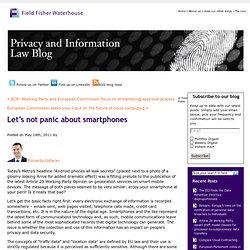
The message of both pieces seemed to be very similar: enjoy your smartphone at your peril! Is it really that bad? Location data should qualify as personal data, watchdogs say. The data should be classified as personal data because it can be used to identify people, the Article 29 Working Party said.
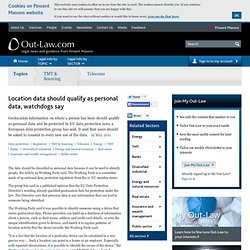
The Working Party is a committee made of up national data protection regulators from the 27 EU member states. The group has said in a published opinion that the EU Data Protection Directive's wording already qualified geolocation data for protection under the law. The Directive says that personal data is any information that can lead to someone being identified. The Working Party said it was possible to identify someone using a device that stores geolocation data. Phone providers can build up a database of information about a person, such as their name, address and credit card details, or even the unique identification given to devices, and match it to regular patterns of location activity that the device records, the Working Party said.
"It is a fact that the location of a particular device can be calculated in a very precise way ... The Secure Times: Article 29 Working Party Adopts Opinion on Geolocation Services on Smart Mobile Devices. IPTitaly. Geolocation: Consent Bombshell from Article 29 WP. Article 29 Working Party Opines on Geolocation Services. Location Data Is Personal and Private Confirms EU Watchdog. The European Union data protection watchdog says that geo-location constitutes private data.
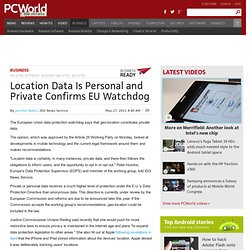
The opinion, which was approved by the Article 29 Working Party on Monday, looked at developments in mobile technology and the current legal framework around them and makes recommendations. "Location data is certainly, in many instances, private data, and there then follows the obligations to inform users, and the opportunity to opt in or opt out," Peter Hustinx, Europe's Data Protection Supervisor (EDPS) and member of the working group, told IDG News Service. Private or personal data receives a much higher level of protection under the E.U.'s Data Protection Directive than anonymous data. This directive is currently under review by the European Commission and reforms are due to be announced later this year.
Google also then came under fire, but the maker of the Android smartphone OS argued that it anonymously processed the data and only recorded it in the first place if mobile users opted in. Free Online PDF Editor, PDF Form Filler & PDF Viewer.